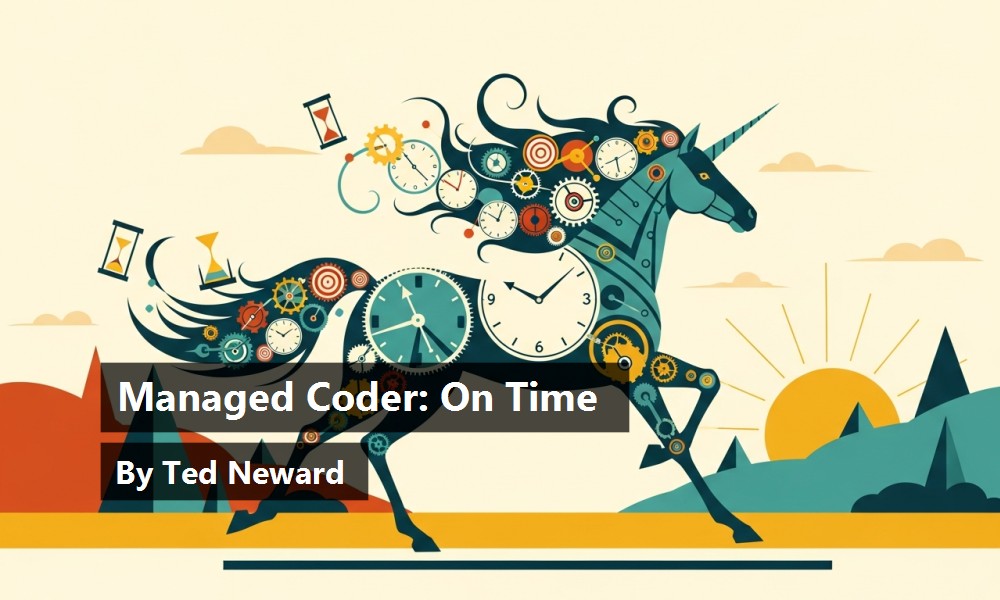For an industry that prides itself on its analytical ability and abstract mental processing, we often don't do a great job applying that mental skill to the most important element of the programmer's tool chest - that is, ourselves.
I have a friend who continuously mocks me for any response that contains the word “busy.” For the past year or so, she will text me, asking some question or remarking on some work idiocy, and it may take me more than a day to reply. Almost without fail, I apologize for the late reply, citing some variation on the phrase “I had stuff to do that kept me too busy to respond.” Time, it seems, gets away from me on quite a regular basis.
Peter Drucker would have a field day with that paragraph.
Drucker on Time
"Effective executives know that time is the limiting factor. The output limits of any process are set by the scarcest resource. In the process we call ‘accomplishment,' this is time." (Effective Executive, p26)
It's not like I don't want to reply to my friend - she's quite the interesting person to talk to, and we have some really good discussions about life, philosophy, technology, and a few other things. It's just that there's always something else to do: prepare for a conference talk, meetings with colleagues and/or future colleagues, write an article for CODE Magazine, dinner, shower, sleep…. And I know I'm certainly not the only one that wrestles with this problem - how many times have you heard phrases like, “If I can find the time” or “If there's enough time” or “Time got away from me” or any of the hundreds of permutations on that theme? It's almost like time is this elusive, mystical unicorn that only the most virtuous of us can find, capture, and enjoy.
“Time is also a unique resource. ... The supply of time is totally inelastic. No matter how high the demand, the supply will not go up. There is no price for it and no marginal utility curve for it. Moreover, time is totally perishable and cannot be stored. Yesterday's time is gone forever and will never come back. Time is, therefore, always in exceedingly short supply.” (p 27)
We each of us receive exactly the same amount of time per day: 24 hours, 60 minutes per hour and 60 seconds per minute. There are numerous memes and motivational posters that will helpfully calculate what that all multiplies into, but the number isn't the point; the point is that time, of all things, is the most egalitarian resource any of us will ever experience. No matter who you are, no matter where you were born, the color of your skin, or the balance in your account, you get exactly the same amount of time per day as the rest of us. And yet, for so many of us, that never seems to be enough. Where does that time go?
“Everything requires time. It is the one truly universal condition. All work takes place in time and uses up time. Yet most people take for granted this unique, irreplaceable, and necessary resource. Nothing else, perhaps, distinguishes effective executives as much as their tender loving care of time.” (p27)
A few years ago, when money was a little tight at the house, my wife and I decided that we were going to shut off regular TV service. This was actually before the heyday of streaming-media platforms that the world enjoys now, so we were making a pretty conscious decision to not have access to a lot of the normal programming that cable subscribers enjoy. We still had the TV itself, of course - we hooked up various console gaming devices to it so that the four of us in the family could spend time collectively tuned in to a video or DVD or game. (Mario Party is by far one of the best multi-player non-intense games ever made, and that's the hill I'll die on if I must.)
What we found is that turning off the TV opened up a whole range of possibilities that we hadn't really spent much time exploring, both collectively and individually. We dove much deeper into board games for our time together at the house. My Kindle exploded with a ton of books, fiction and non-, that I now have with me. Even as I write this, there's no TV on anywhere in the house - everybody is engaged in some other pursuit, even video-gaming, that requires more attention and interaction than just drooling in front of the TV.
Turning off the TV told us that a lot of our time was going to watching TV. Where do you spend your time?
Spending time
To be clear, you don't have to be an effective executive to understand time and its impact on your day. Drucker wrote, “… [M]ost of the tasks of the executive require, for minimum effectiveness, a fairly large quantum of time. To spend in one stretch less than this minimum is sheer waste. One accomplishes nothing and has to begin all over again. ... To write a report may, for instance, require six or eight hours, at least for the first draft. It is pointless to give seven hours to the task by spending fifteen minutes twice a day for three weeks. All one has at the end of the is blank paper with some doodles on it.” (p30) Drucker intuitively understood the concept of flow, and software developers almost universally intuitively understand that as well. “The same goes for an experiment. One simply has to have five to twelve hours in a single stretch to set up the apparatus and to do at least one completed run. Or one has to start all over again after an interruption.” (p30) Substitute “experiment” and “apparatus” with “feature” and “environment,” and that sentence could easily appear in any developer's handbook or blog post.
Drucker doesn't just end there, though: He also knew that people require time, too. I can't have a firm connection with my colleagues or co-workers or direct reports or managers if I can't spend a minimum quantum of time with them. “The manager who thinks that he can discuss the plans, direction, and performance of one of his subordinates in fifteen minutes is just deceiving himself. If one wants to get to the point of having an impact, one needs probably at least an hour and usually much more. And if one has to establish a human relationship, one needs infinitely more time.” (p31)
If your job is to manage people - and that is the job of managers, after all, foremost among all other tasks - then there needs to be a steady, deliberate and consistent investment of time on your part. "People-decisions are time-consuming, for the simple reason that the Lord did not create people as ‘resources' for organization. They do not come in the proper size and shape for the tasks that have to be done… and they cannot be machined down or recast for these tasks. People are always ‘almost fits' at best." (p35) No matter who they are or what they know or how long they've been with the organization, they will always have weaknesses that need shoring up and/or a lack of knowledge that needs fixing and/or any of a dozen other situations that require your time and attention. Some people will be free about admitting what they don't know; some will see the admission of ignorance as a critical weakness; and some simply won't realize that there are things they don't know. It's on you to make sure that all three categories of people are supported.
Summary
So, what now? “Time is precious, yeah, we get it. What do we do, then?”
For starters, admit that you probably don't know where the time goes in your day. Start a journal or a time log. Record yourself or get an activity-tracking app for your laptop or mobile device that keeps a log of where you spend your day. I'll bet you a nice bottle of wine that however you think you spend your time, there's going to be something in that report that surprises you.
Then, armed with this knowledge, start making more specific decisions. If you choose to play a video game, because you need to relax, then do so with finite limits put into place. (I allow myself one co-op match on Starcraft II, for example, when I need to let my brain work on a problem subconsciously.) If you want to watch TV, go for it! Nothing wrong with that. Just make sure you know when you're going to stop. And so on. But be aware of how you can also shift resources from one area into another - in my house, we've had maids come clean every week or so, because when I compare the cost of having them clean the house against the time I (and my family) would have to spend doing it (and not as well), it's a total no-brainer. Ditto for the gardener. This is one area where I can shift capital to spend time on other things.
Most of all, be very concerned with how your actions waste other peoples' time. When setting up a meeting, does every single individual need to be there? Are they there because they will be contributors, or because you just want them to know the meeting is about to happen? Could they get an hour back if you just sent them a summary of the meeting afterwards? I routinely ignore company all-hands meetings: I can use that hour or two to get other things done, and anything super-urgent that I need to know will inevitably filter back to me either directly or indirectly.
Time is a precious resource. Treat it with the same care and diligence as you do your finances, if not more so, and you will suddenly find that you are getting so much more out of it.






